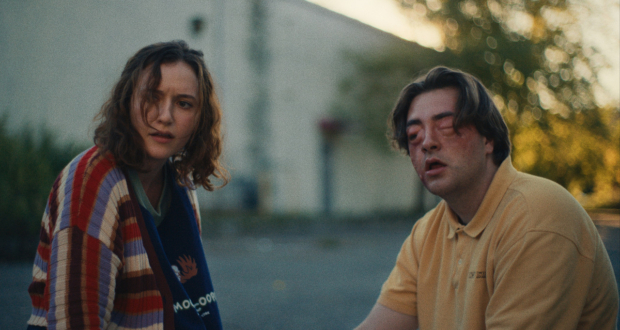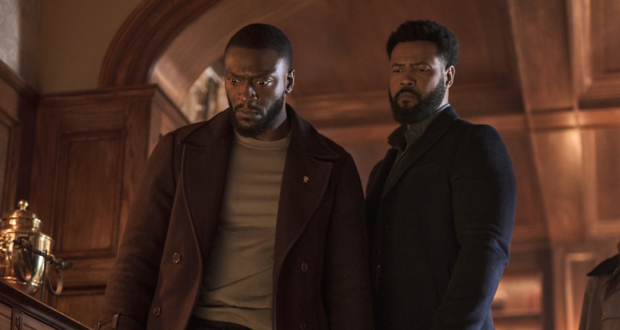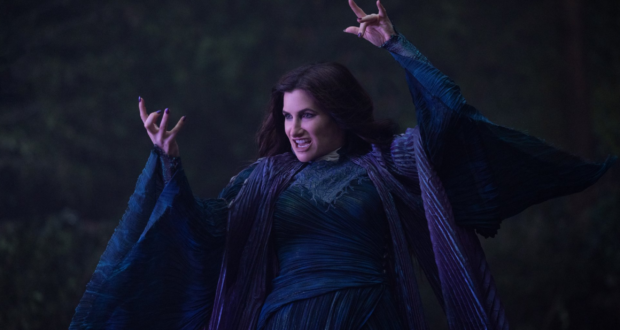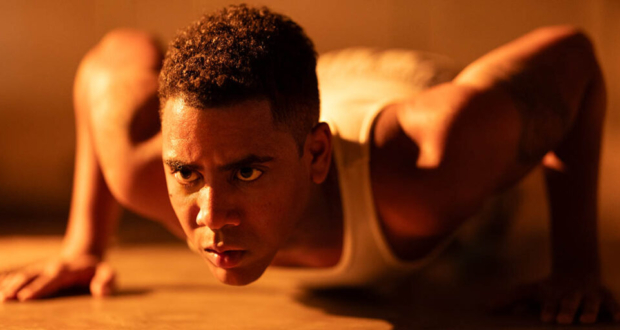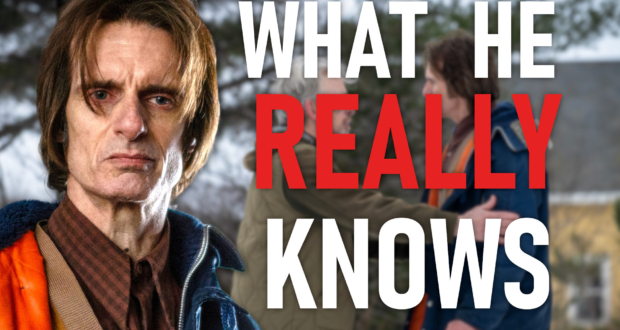Suzanne Weinert is the president of Flatiron Pictures, located in Austin (TX),which specializes in producing independent feature films throughout the Southwest. Her short “A Good Son,” which she directed, just had its World Premiere at SXSW. Thematically, it bears some resemblance to a Burt Reynolds film, “The End.” (1978). It is playing at the Boston Film Festival April 11-16 ; the hope is that the feature of “A Good Son” (which exists) might attract Boston-based filmmakers and a star like Alan Arkin.
Suzanne has been producing, writing and, now, directing films since she answered an ad for an intern while a student at Columbia University and ended up assisting Director Ron Howard as he helmed “The Paper” (released in 2004). After that start, while still working on her MFA in Filmmaking, Suzanne began working for Julia Roberts’ Production Company, Shoelace Productions, and rose to become Vice President of that organization.
Suzanne has worked on such films as “Conspiracy theory” (1997), “Notting Hill” (1999), “Runaway Bride” (1999) and “The Paper” (1994) and also on “Hellion” (2014) and as the writer of the 2009 film “The ExTerminators” (Heather Graham, Jennifer Coolidge and Amber Heard) which, after it ran at SXSW that year, she says, “changed my life.”
The write-up in this year’s SXSW program for her short “A Good Son” is this: “When Tommy, 75, asks his son Mike to put a Hefty bag over his head and suffocate him to death, neither believes the other will really go through with it. Until Mike’s son, Chris, 17, devises a plan that will satisfy both his father and grandfather.”
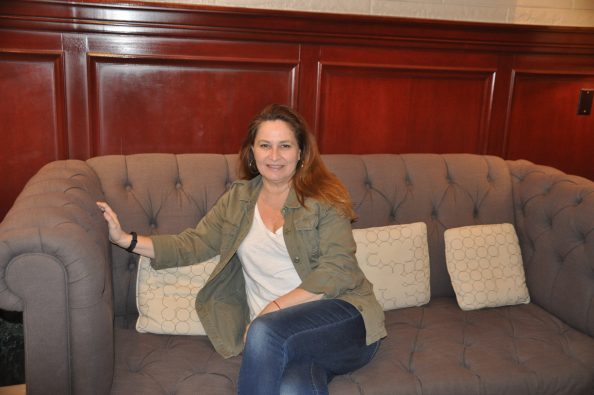
Suzanne Weinert of Austin-based Flatiron Pictures, talking movies and “A Good son.” (Photo by Connie Wilson).
When we spoke about making movies and the theme of this particular effort, Suzanne shared these insights: “I’ve had a lot of people say to me, since they saw the short, ‘This is a conversation that’s actually going on in my house.’” She mentioned the “sandwich generation” (as the group of young people caught between caring for their own families and caring for their elderly parents is sometimes called) and asked me if I’d seen the appearance of Bea Smith’s husband on “The View.”
Bea Smith was a famous restauranteer. Several years ago Bea and her spouse sat down and talked about what to do in the event of either of them got Alzheimer’s or dementia or some other debilitating illness that would require extensive assistance. They spelled out everything each would want. Bea’s husband has done everything she asked, but when he brought another woman to their house— someone he met after Bea’s condition worsened— who has helped him care for his ailing wife, that was controversial to many, if not to the couple themselves.
A recent news article about comedian Tim Conway, 86, shared that Conway’s wife of many years and his adult daughter were in court arguing about care for the former member of Carol Burnet’s comedy troupe, who has severe dementia and is largely unresponsive now. Stan Lee’s death was similarly controversial and in the press a few months ago.
As Suzanne said, “They (Bea Smith & her husband) had this conversation. In America, we seem to have decided that dying is optional, so no one wants to talk about it. But the truth is, it’s going to happen to everyone and we all need to be talking about it.”
Q: I asked Suzanne, “What is your background?”
A: “I went to Columbia undergrad. I got a B.A. from Barnard College and then I got a Master’s degree. I started the Master’s program in Dramatic Writing and quickly realized that was not what I wanted to do, so I transferred and ended up getting an MFA in Screenwriting and Filmmaking.
While I was there, Ron Howard was looking for an intern. It was on the internship bulletin board. It said, ‘Director is seeking intern for feature film.’ I ripped off the thing and I called the number. It was Ron Howard. He was looking for an intern to work with him. So, I went down and had the interview. Kathryn Bigelow was my idol, and I remember having this conversation with Ron about Kathryn and how she’s my idol. When I was done and walked out, I thought, ‘I can’t even believe I said all these things to him.’ But he called me the next day and said, ‘I think this would be a good job for you.’ So, I was literally his intern. The Paper was a big movie. It had Michael Keaton, who had just done 2 Batmans, Glenn Close and Marisa Tomei, who had just won the Oscar for My Cousin Vinny, Randy Quaid, Robert DuVall, Jason Robards, Jason Alexander, Catherine O’Hara, Spalding Grey. The film was ‘The Paper.” (released in 2004) I was still in film school. I was in my second year. I said, ‘Oh, my gosh. I got this thing.’ It paid no money.”
Q: What was it like working for Ron Howard?
A: “I was so lucky to work with someone at that stage in my career who was so wonderful, so kind, so personally generous. Ron Howard set the bar on how you should behave. I remember after just a few weeks—a teamster was coming to pick him up every morning from New Jersey. He had to come down the west side, anyway. Instead of leaving me to take public transportation at 5 o’clock in the morning, Ron would have his teamster come and pick me up first. So, I would get 15 minutes alone in the car every morning with Ron Howard.
After a while, he said to me, ‘We should pay you something.’ So, any little job along the way he would throw my way. I got to be in a scene one day, and I got paid for that. Another time I got to work with the second unit for a day as a P.A. (production assistant). Everyone took care of me. The Teamsters took care of me. I remember the last day of shooting I gave my teamster driver a pie. I’m not a cook, but I baked him a pie. For my first time on a film set, it was so magical.
But, the beauty of it was that, if Ron was there, I got to be there, which is not always the case for interns. The one thing I remember is that being a director means being able to handle 1,000 questions at one time. It was amazing. The script was written by David Koepp and Stephen Koepp who went on to become some of the biggest screenwriters of all, at the time, but this was one of their earlier works. It was 1992. This was one of their first ones before they started doing, like Jurassic Park, Stir of Echoes and Spiderman (2002).”
After the Ron thing was done—he was going on to prep “Apollo 11”— the chairwoman of the department knew that someone was starting a production company in New York and she thought of me. I went to the interview and I got that job. It was Julia Roberts.
They wanted someone to read scripts and to work hard. I was really lucky. They made it really easy for me to have responsibility. And, I got to stay in New York. I was living on 16th Street. After a few months we moved the office to 19th Street. Her president of production was a guy who was so kind, so gracious. She had a process of taking a script from there to the screen. They were super welcoming—not at all the stories you hear about Hollywood. I thought, ‘I’ll stay for 2 years. I’ll get some experience, and then I’ll just go somewhere and start to write screenplays for money.’ But I was having such a good time I stayed 7 and ½ years. I stayed 4 times longer than I thought I would be there.

Suzanne Weinert, Writer/Director of “A Good Son” at SXSW. (Photo by Connie Wilson).
Q: Other Julia Roberts stories, beyond working on “Runaway Bride,” “Conspiracy Theory” and “Notting Hill?”
A: I love to travel. I’m a big traveler. I’ve always volunteered for Habitat for Humanity. At one point there came a time where Julia had an opportunity to go to Borneo for a while and do a thing about orangutangs. Lewis Leaky had 3 graduate students he sent to Africa: Diane Fosse and Jane Goodall and Dr. Birute Mary Galdikas. Jane has remained this beautiful woman. Diane was unfortunately killed. The third woman is still in Borneo and runs an orangutang rescue and that’s who we stayed with.”
My habitat work, I’ve slept on church pews for a month in Alaska. I’m used to roughing it, so when Julia said, ‘Come on…do you want to go to the Borneo jungle?’ I said, ‘Sure!’ So we did that one and a few years later we did one in Mongolia. We went to Mongolia and out to the Gobi Desert for several weeks. So, the job changed, too. We just kept doing things that were personally fulfilling. To me, to go to these exotic places with these wonderful crews from Britain and elsewhere…it was so fantastic!”
Q: After the orangutang experience, what was next?
A: We did orangutangs in ’97 and then we came back and did a bunch more movies, and then we went to Mongolia. At that point I had been writing scripts, and I just really wanted to jumpstart my writing career. I had just sort of gotten sidetracked for 7 years having a great time. I think I was like 34, maybe. It just seemed like a good time.
I really had always had this vision that I would just sit, with a view, and write. I think it was kind of like a ‘now or never’ thing. So I left. Something happens around 33, 34, I think. You start thinking: all right. So, then I spent a whole bunch of time writing and living in New York. I wrote ExTerminators (Heather Graham, Jennifer Coolidge, Amber Heard, directed by John Inwood). It showed at SXSW, and it changed my life. I’ve filmed 12 movies in Texas recently.”
Q: Was there ever a moment when you had to make a decision on whether to stay or whether to leave the position as Vice President of Julia Roberts’ Shoelace Productions?
A: I just knew. Someone did a paper on a theory that every 7 years you change. You are different. You are physically different. I think that was part of it.
My short this year (“A Good Son”) screened on the first Friday, which was great for me, but a lot of my friends couldn’t see it. .” ‘A Good Son’ really is based on a true story. Tommy Ryan really is a very virile 75-year-old man. I wanted to be honest that this is a man who has lived, by his own admission, a full life. He feels satisfied. Married to the same woman for 40 years. Raised a couple of decent kids. He doesn’t want to become feeble and have the last few years of his life be a drag. I really wanted it to say, ‘Sometimes, you’re just done.
I wrote the short because I wanted to have something to show to others. So, the next step, after the short makes the festival circuit (it plays in Boston April 11-16), is going to be taking the feature out. I would like to see the film made at the feature level, but no one is going to give me $30 million dollars easily. Alan Arkin would be my dream casting. Or Robert Duvall. A friend of mine directed “Get Low” and Bill Murray played in it. (Duvall was in “The Paper’”) Alan Arkin still seems very strong and virile and alive, to me. The Boston teams—the Bruins, etc.— are a big part of the short. There are all these Boston actors and Boston directors. Jon Hamm. Mark and Donny Wahlberg. Matt Damon. Ben Affleck.
Then you start to think about what Boston-based or Boston-bred actors and directors might actually want to direct a movie about a bunch of guys from Boston. That’s kind of the direction I’m taking. There’s already a network. There’s no women in it; I don’t know exactly how to get them in there, but I want the short to do well and then ask the Boston-based directors, ‘Here’s a film about your town.’” How do I reach out to the Boston directors/actors?
Q: Which is the better route: a college film making program or starting to direct on your own when young?
A: Columbia’s under grad at the time did not offer a film program. U.T. (University of Texas)has a good program where you actually get to make a short. My undergrad degree is in dramatic writing—plays and things like that. I actually had to go back to film school to study that; it was a different era.
I would say now that if you got out of school and all you had was a Bachelor’s in English, you might be at a disadvantage. I learned how to work every single piece of equipment on the set and I still have a circle of closest friends who are people I trust when it comes to work, so it gave me a great start.
It helps to be in a place where film is considered a possibility. I enjoyed having that background. It gave me a great team of people who are still in play. You need to live in a place where film is considered an option. Austin is a great town. (Suzanne winters here; spends the hot summers in Auckland, New Zealand).
The people who are still here (the industry has shrunk considerably) are willing to help the people who are just starting out. We have a film society here that is willing to help people out. Austin is a great town for this. Dallas, Houston, Atlanta—they all have a film society organized. I don’t know any other way, so, for me, graduate school was the only possible way to go. My friends kind of went a different way.
They got into advertising. They never crossed over. Once you get into advertising you stay in advertising because the money is so good and so consistent. I’ve never had to live in L.A. I can be anywhere to write. I grew up an only child in New York, but after 2009 I moved to Austin. I joined the board of the Austin Film Society in 2012, became vice president in 2014 and then President in 2016. It’s a purely voluntary position. Everyone on the board donates their time. I just really wanted to give back to the community while writing and producing movies through Flatiron. Every movie that I made we shot somewhere in Texas. I shot 12 movies here in Texas and I go to L.A. a couple days each month, because my manager is there and my legal team is there and a lot of the directors I work with are there. You have to go there, but you don’t have to live there.”
Q: Isn’t part of the job of a producer raising money?
A: Yes.
Q: How does one do that?
A: It’s really hard and it’s gotten harder. Extra funds seem to have dried up now. Oil is not as high, per barrel, as it used to be. People are not as willing to take a risk.
Q: What are the best states that offer perks to aspiring filmmakers?
A: Atlanta is pretty consistent. To the best of my knowledge, that’s in perpetuity. They’re just going to keep doing it for a long time. Louisiana. New Mexico. Oklahoma has a very good program, but it has a cap on it. Michigan tried it for a while. Indiana. Massachusetts. New York. States like Georgia have found it to be successful. New York is clued into the fact that it is really successful.
Q: You’d like to see top notch talent attach itself to the idea of the short?
A: Yes. Then, my production company owns the rights to about 10 different projects. My immediate goal is to get the feature of “The Good Son” done.
Q: What’s next for Suzanne:
A: My short is actually based on a feature script I wrote a few years ago. As I said, I’m hoping to shop that around once the short finishes its festival run. Scriptwise, a horror movie I wrote called “Ghost Passenger” is set to start pre-production this summer. And I recently set up a rom com called “Previously Engaged” at Intrepid Pictures. Directing wise, I’m going to shoot a pilot for an Austin-based TV series I created this fall. So 2019 is turning out to be a pretty busy year.”
-
Acting - /10
0/10
-
Cinematography/Visual Effects - /10
0/10
-
Plot/Screenplay - /10
0/10
-
Setting/Theme - /10
0/10
-
Watchability - /10
0/10
-
Rewatchability - /10
0/10



